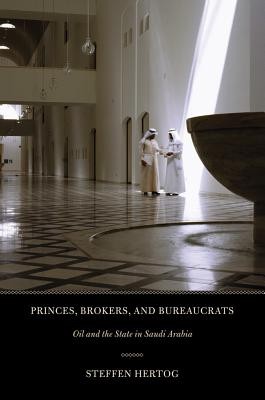
- We will send in 10–14 business days.
- Author: Steffen Hertog
- Publisher: Cornell University Press
- ISBN-10: 080144781X
- ISBN-13: 9780801447815
- Format: 16.4 x 23.5 x 2.5 cm, kieti viršeliai
- Language: English
- SAVE -10% with code: EXTRA
Reviews
Description
In Princes, Brokers, and Bureaucrats, the most thorough treatment of the political economy of Saudi Arabia to date, Steffen Hertog uncovers an untold history of how the elite rivalries and whims of half a century ago have shaped today's Saudi state and are reflected in its policies. Starting in the late 1990s, Saudi Arabia embarked on an ambitious reform campaign to remedy its long-term economic stagnation.
The results have been puzzling for both area specialists and political economists: Saudi institutions have not failed across the board, as theorists of the "rentier state" would predict, nor have they achieved the all-encompassing modernization the regime has touted. Instead, the kingdom has witnessed a bewildering mélange of thorough failures and surprising successes. Hertog argues that it is traits peculiar to the Saudi state that make sense of its uneven capacities.
Oil rents since World War II have shaped Saudi state institutions in ways that are far from uniform. Oil money has given regime elites unusual leeway for various institutional experiments in different parts of the state: in some cases creating massive rent-seeking networks deeply interwoven with local society; in others large but passive bureaucracies; in yet others insulated islands of remarkable efficiency. This process has fragmented the Saudi state into an uncoordinated set of vertically divided fiefdoms.
Case studies of foreign investment reform, labor market nationalization and WTO accession reveal how this oil-funded apparatus enables swift and successful policy-making in some policy areas, but produces coordination and regulation failures in others.
EXTRA 10 % discount with code: EXTRA
The promotion ends in 22d.04:11:23
The discount code is valid when purchasing from 10 €. Discounts do not stack.
- Author: Steffen Hertog
- Publisher: Cornell University Press
- ISBN-10: 080144781X
- ISBN-13: 9780801447815
- Format: 16.4 x 23.5 x 2.5 cm, kieti viršeliai
- Language: English English
In Princes, Brokers, and Bureaucrats, the most thorough treatment of the political economy of Saudi Arabia to date, Steffen Hertog uncovers an untold history of how the elite rivalries and whims of half a century ago have shaped today's Saudi state and are reflected in its policies. Starting in the late 1990s, Saudi Arabia embarked on an ambitious reform campaign to remedy its long-term economic stagnation.
The results have been puzzling for both area specialists and political economists: Saudi institutions have not failed across the board, as theorists of the "rentier state" would predict, nor have they achieved the all-encompassing modernization the regime has touted. Instead, the kingdom has witnessed a bewildering mélange of thorough failures and surprising successes. Hertog argues that it is traits peculiar to the Saudi state that make sense of its uneven capacities.
Oil rents since World War II have shaped Saudi state institutions in ways that are far from uniform. Oil money has given regime elites unusual leeway for various institutional experiments in different parts of the state: in some cases creating massive rent-seeking networks deeply interwoven with local society; in others large but passive bureaucracies; in yet others insulated islands of remarkable efficiency. This process has fragmented the Saudi state into an uncoordinated set of vertically divided fiefdoms.
Case studies of foreign investment reform, labor market nationalization and WTO accession reveal how this oil-funded apparatus enables swift and successful policy-making in some policy areas, but produces coordination and regulation failures in others.


Reviews